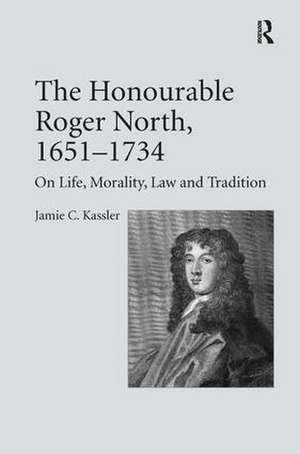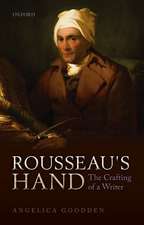The Honourable Roger North, 1651–1734: On Life, Morality, Law and Tradition
Autor Jamie C. Kassleren Limba Engleză Hardback – 6 mai 2009
Preț: 1054.71 lei
Preț vechi: 1286.24 lei
-18% Nou
Puncte Express: 1582
Preț estimativ în valută:
201.82€ • 208.21$ • 168.42£
201.82€ • 208.21$ • 168.42£
Carte tipărită la comandă
Livrare economică 26 martie-09 aprilie
Preluare comenzi: 021 569.72.76
Specificații
ISBN-13: 9780754658863
ISBN-10: 0754658864
Pagini: 488
Dimensiuni: 156 x 234 x 27 mm
Greutate: 0.45 kg
Ediția:1
Editura: Taylor & Francis
Colecția Routledge
Locul publicării:Oxford, United Kingdom
ISBN-10: 0754658864
Pagini: 488
Dimensiuni: 156 x 234 x 27 mm
Greutate: 0.45 kg
Ediția:1
Editura: Taylor & Francis
Colecția Routledge
Locul publicării:Oxford, United Kingdom
Cuprins
Contents: Introduction; Part I An Interpretation of Roger North (1651-1734): Outlines of a life; How to live independently; Custom the arbiter of human life; Summary and Conclusion. Part II An Edition of Roger North's 'Of Etimology' (c1706-c1715): Introduction to the edition; British Library Additional Manuscript 32530: ff5-111v; Glossary; Appendices; References; Indices.
Notă biografică
Jamie C. Kassler was elected as a fellow (1991) of the Australian Academy of the Humanities for contributions to musicological theory and was a recipient of the Centenary Medal (2003) for service to Australian society and the humanities in the study of philosophy. A collection of her articles was published as Music, Science, Philosophy: Models in the Universe of Thought (Ashgate 2001). She is also the author of The Beginnings of the Modern Philosophy of Music (Ashgate, 2004).
Recenzii
'Jamie Kassler is the leading authority on Roger North, and over the years she has been responsible for careful and illuminating editions of North’s writings. Her new edition of Of Etimology continues this invaluable editing work. It also provides a monograph-length essay on North’s conception of the persona of the natural philosopher and humanist, integrated into a thoughtful treatment of his life. This essay provides what is now the best starting point for readers coming to North for the first time.' Stephen Gaukroger, University of Sydney, Australia
'This book has much to offer: Kassler exploits North's surviving papers (numbering over fifty thousand leaves) with assiduity to establish greater coherence to North's sprawling intellectual accomplishment… Its comprehensive bibliography and original analysis make it the starting point for future studies of Roger North.' Journal of British Studies
'This is a scholarly and thoughtful work which presents a coherent interpretation of North.' Parergon
'… a most useful contribution to the fund of resources on the tumultuous seventeenth century, as well as providing a new valuation of the very remarkable Roger North and his many pursuits.' Seventeenth Century News
'The Honourable Roger North is a model of how to present scholarly research, with clear, large print, illustrations, and proper, bottom-of-the-page footnotes. References are carefully explained, and there is a large glossary of the common law and other terms North uses that are unfamiliar to modern readers… The book also has an excellent index covering both main parts and the appendices. It will be principally of interest to intellectual historians and historians of English jurisprudence.' Sixteenth Century Journal
'It is only in the last forty years that North’s original manuscripts have been systematically analysed, and Kassler’s research in piecing together, identifying and dating North’s manuscripts and notes will be invaluable to future scholars of his work… The fresh approach to the subject matter and the presentation of new material incorporated into a carefully edited and well-researched volume will be highly anticipated by those studying North and of great interest to historians and philosophers of language, law and politics of this and other periods.' Journal of Eighteenth-Century Studies
'This book has much to offer: Kassler exploits North's surviving papers (numbering over fifty thousand leaves) with assiduity to establish greater coherence to North's sprawling intellectual accomplishment… Its comprehensive bibliography and original analysis make it the starting point for future studies of Roger North.' Journal of British Studies
'This is a scholarly and thoughtful work which presents a coherent interpretation of North.' Parergon
'… a most useful contribution to the fund of resources on the tumultuous seventeenth century, as well as providing a new valuation of the very remarkable Roger North and his many pursuits.' Seventeenth Century News
'The Honourable Roger North is a model of how to present scholarly research, with clear, large print, illustrations, and proper, bottom-of-the-page footnotes. References are carefully explained, and there is a large glossary of the common law and other terms North uses that are unfamiliar to modern readers… The book also has an excellent index covering both main parts and the appendices. It will be principally of interest to intellectual historians and historians of English jurisprudence.' Sixteenth Century Journal
'It is only in the last forty years that North’s original manuscripts have been systematically analysed, and Kassler’s research in piecing together, identifying and dating North’s manuscripts and notes will be invaluable to future scholars of his work… The fresh approach to the subject matter and the presentation of new material incorporated into a carefully edited and well-researched volume will be highly anticipated by those studying North and of great interest to historians and philosophers of language, law and politics of this and other periods.' Journal of Eighteenth-Century Studies
Descriere
Roger North (1651-1734) is known today as a biographer and writer on music, architecture and estate management. Yet his writings, including thousands of pages still in manuscript, also contain critical reflections about intellectual and social changes taking place in England. Eschewing the 'Whig' stereotypes of North, Jamie C. Kassler provides the first interpretation of his philosophy. She reveals that North, a common lawyer by profession, combined the morality of the sceptic, Montaigne, with the jurisprudence of the common lawyers, Coke, Selden and Hale. This unusual combination grounded North's critical reflections on the dogmatism of natural-law doctrine, both in its medieval intellectualist version and in its voluntarist reformulation that began with Grotius and was developed by Hobbes, Pufendorf and Locke.















